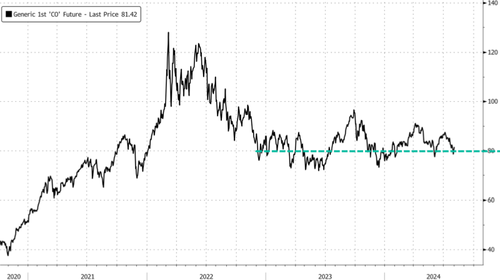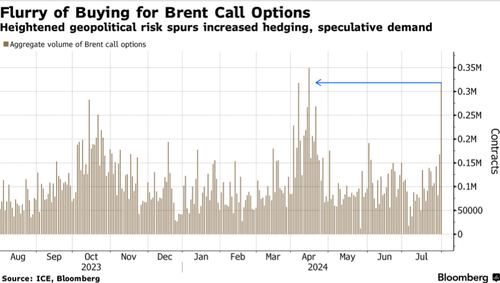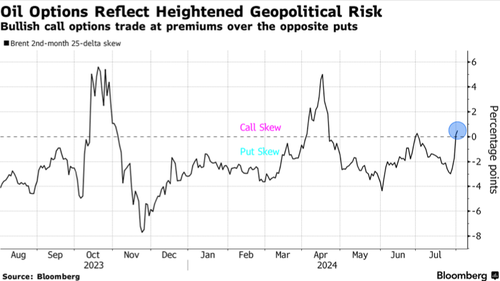Brent crude's price trajectory hangs in the balance as OPEC+ ministers discuss output policy on Thursday. Insiders tell Reuters that the cartel will likely stick to its current production cuts, though a partial rollback is slated this fall. Meanwhile, geopolitical tensions continued to soar as Iran ordered a retaliatory strike on Israel following the assassination of a political Hamas leader in Tehran.
Top ministers from OPEC+ will discuss crude output policy during an online joint ministerial monitoring committee meeting on Thursday morning. Sources tell Reuters there will be no changes to the current cutting policy that has slashed 5.86 million barrels per day (bpd), or about 5.7% of global demand since late 2022.
In June, the Organization of the Petroleum Exporting Countries and allies led by Russia agreed to extend cuts of 3.66 million bpd through the end of 2025. OPEC+ also extended the most recent round of cuts - a 2.2 million bpd cut by eight members - to the end of September.
In addition to traders monitoring OPEC+ headlines, many are on edge, awaiting the next batch of headlines from the Middle East as war risks broaden.
On Wednesday, Brent soared through the $81/bbl handle, while West Texas Intermediate traded above $78/bbl after posting the largest single daily gain since October. This comes after Iran's Ayatollah Ali Khamenei called for a direct strike on Israel, the New York Times reported. This followed an Israeli assassination operation of a political leader of Hamas in Tehran and a senior Hezbollah member in Beirut.
Here's the latest reporting:
-
A 'Watershed Event': Five Takeaways From Israel's Assassination Of Hamas' Political Leader In Tehran
-
US Will 'Certainly' Defend Israel If Attacked By Iran In Wake Of Haniyeh Killing
-
Eight Other Times Israel Likely Behind Covert Assassinations In Iran
-
Ayatollah Says 'Severe' Revenge Coming For Israel Killing Hamas Leader On Iranian Soil
-
US Will 'Certainly' Defend Israel If Attacked By Iran In Wake Of Haniyeh Killing
Meanwhile, rising Middle East tensions unleashed a flurry of Brent call options, with as many as 300k calls trading Wednesday. This was the highest number of call options that traded on Brent since the brief Israel and Iran turmoil in April.
More than 300,000 Brent call option contracts traded on Wednesday, the largest one-day amount since the last round of elevated regional tensions in April. The volume was dominated by large call spreads, which offer cheaper ways to profit from a rally, including $87 and $90 spreads for October, as well as $110 and $130 spreads for November. Brent was last near $81. -BBG
Call options on Brent crude spiked Wednesday to the highest level since mid-April.
Option market now suggests traders are concerned about geopolitics.
"The biggest determinant of where prices might go is a combination of geopolitics, but critically OPEC's decision in the coming weeks around the pace at which it unwinds its cuts, and of course the Chinese demand," Wael Sawan, Chief Executive Officer of Shell Plc said in a Bloomberg TV interview. He added, "At the moment we see that the physical markets are well balanced, if anything slightly tight."
Brent crude's price trajectory hangs in the balance as OPEC+ ministers discuss output policy on Thursday. Insiders tell Reuters that the cartel will likely stick to its current production cuts, though a partial rollback is slated this fall. Meanwhile, geopolitical tensions continued to soar as Iran ordered a retaliatory strike on Israel following the assassination of a political Hamas leader in Tehran.
Top ministers from OPEC+ will discuss crude output policy during an online joint ministerial monitoring committee meeting on Thursday morning. Sources tell Reuters there will be no changes to the current cutting policy that has slashed 5.86 million barrels per day (bpd), or about 5.7% of global demand since late 2022.
In June, the Organization of the Petroleum Exporting Countries and allies led by Russia agreed to extend cuts of 3.66 million bpd through the end of 2025. OPEC+ also extended the most recent round of cuts - a 2.2 million bpd cut by eight members - to the end of September.
In addition to traders monitoring OPEC+ headlines, many are on edge, awaiting the next batch of headlines from the Middle East as war risks broaden.
On Wednesday, Brent soared through the $81/bbl handle, while West Texas Intermediate traded above $78/bbl after posting the largest single daily gain since October. This comes after Iran's Ayatollah Ali Khamenei called for a direct strike on Israel, the New York Times reported. This followed an Israeli assassination operation of a political leader of Hamas in Tehran and a senior Hezbollah member in Beirut.
Here's the latest reporting:
-
A 'Watershed Event': Five Takeaways From Israel's Assassination Of Hamas' Political Leader In Tehran
-
US Will 'Certainly' Defend Israel If Attacked By Iran In Wake Of Haniyeh Killing
-
Eight Other Times Israel Likely Behind Covert Assassinations In Iran
-
Ayatollah Says 'Severe' Revenge Coming For Israel Killing Hamas Leader On Iranian Soil
-
US Will 'Certainly' Defend Israel If Attacked By Iran In Wake Of Haniyeh Killing
Meanwhile, rising Middle East tensions unleashed a flurry of Brent call options, with as many as 300k calls trading Wednesday. This was the highest number of call options that traded on Brent since the brief Israel and Iran turmoil in April.
More than 300,000 Brent call option contracts traded on Wednesday, the largest one-day amount since the last round of elevated regional tensions in April. The volume was dominated by large call spreads, which offer cheaper ways to profit from a rally, including $87 and $90 spreads for October, as well as $110 and $130 spreads for November. Brent was last near $81. -BBG
Call options on Brent crude spiked Wednesday to the highest level since mid-April.
Option market now suggests traders are concerned about geopolitics.
"The biggest determinant of where prices might go is a combination of geopolitics, but critically OPEC's decision in the coming weeks around the pace at which it unwinds its cuts, and of course the Chinese demand," Wael Sawan, Chief Executive Officer of Shell Plc said in a Bloomberg TV interview. He added, "At the moment we see that the physical markets are well balanced, if anything slightly tight."



